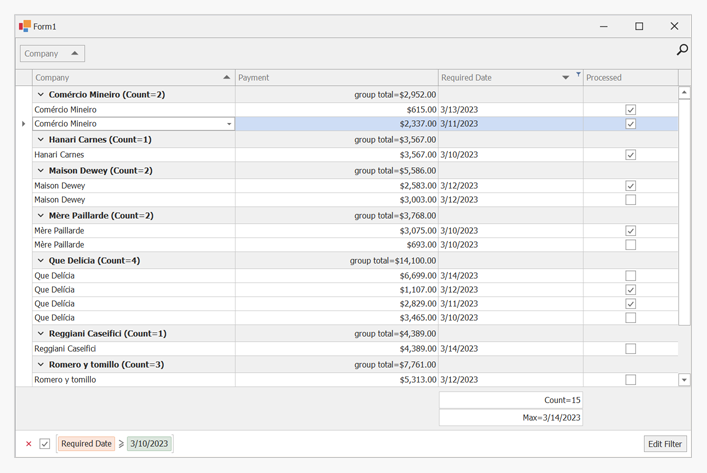RepositoryItemComboBox Class
Represents a repository item which stores settings specific to ComboBoxEdit controls.
Namespace: DevExpress.XtraEditors.Repository
Assembly: DevExpress.XtraEditors.v25.2.dll
NuGet Package: DevExpress.Win.Navigation
Declaration
[DXLicenseWinFormsEditors]
public class RepositoryItemComboBox :
RepositoryItemPopupBaseAutoSearchEdit,
IDxHtmlDesignerDataProviderRemarks
The RepositoryItemComboBox class provides properties and events specific to ComboBoxEdit controls. You can access these settings via the editor’s ComboBoxEdit.Properties property.
The main settings provided by the RepositoryItemComboBox class include:
- the RepositoryItemComboBox.Items property holding a collection of items to display in the dropdown list;
- the RepositoryItemComboBox.AutoComplete property specifying whether end-users can select items by typing the first characters;
- the RepositoryItemComboBox.CycleOnDblClick property allowing you to cycle through items by double-clicking the edit box;
- the RepositoryItemComboBox.DrawItem event allowing you to custom paint dropdown list items.
You only have to create standalone repository items to specify inplace editors for container controls.
Example
The following example creates a GridControl at runtime and shows how to perform basic customization tasks:
- Bind the grid to a data source
- Access the View that displays the underlying data
- Access columns
- Assign an in-place editor (a combo box editor) to a column
- Sort and group data
- Calculate total and group summaries
- Create a filter
- Hide columns and calculate column “best” widths
- Expand group rows
- Focus a specific cell
- Specify DataAnnotation attributes (column display names and data formats) at the data source level
Note
Add the corresponding assemblies to your Windows Forms project.
Read the following topic for information: Redistribution and Deployment of .NET Framework Apps.

using System;
using DevExpress.ClipboardSource.SpreadsheetML;
using DevExpress.Data;
using DevExpress.XtraEditors;
using DevExpress.XtraEditors.Repository;
using DevExpress.XtraGrid;
using DevExpress.XtraGrid.Columns;
using DevExpress.XtraGrid.Views.Grid;
using System.ComponentModel;
using System.ComponentModel.DataAnnotations;
using System.Runtime.CompilerServices;
using System.Windows.Forms;
namespace DXApplication {
public partial class Form1 : XtraForm {
public Form1() {
InitializeComponent();
this.Load += Form1_Load;
}
private void Form1_Load(object sender, EventArgs e) {
GridControl gridControl1 = new GridControl() {
Name = "gridControl1",
Parent = this,
Dock = DockStyle.Fill
};
gridControl1.DataSource = DataHelper.GetData(30);
// The grid automatically creates columns for the public fields found in the data source.
// Calling the gridView1.PopulateColumns method is not required unless gridView1.OptionsBehavior.AutoPopulateColumns is disabled.
// The grid automatically creates a GridView that displays the underlying data as a two-dimensional table.
GridView gridView1 = gridControl1.MainView as GridView;
// Obtain created columns.
GridColumn colCompany = gridView1.Columns["CompanyName"];
GridColumn colID = gridView1.Columns["ID"];
GridColumn colDate = gridView1.Columns["RequiredDate"];
GridColumn colPayment = gridView1.Columns["Value"];
GridColumn colProcessed = gridView1.Columns["Processed"];
// The Company column uses a ComboBox in-place editor that shows a list of available companies.
RepositoryItemComboBox riComboBox = new RepositoryItemComboBox();
riComboBox.Items.AddRange(DataHelper.companies);
gridControl1.RepositoryItems.Add(riComboBox);
colCompany.ColumnEdit = riComboBox;
// Hide a column.
colID.Visible = false;
// Group and sort data.
colCompany.GroupIndex = 0;
colDate.SortIndex = 0;
colDate.SortOrder = DevExpress.Data.ColumnSortOrder.Descending;
// Show group columns in the table.
gridView1.OptionsView.ShowGroupedColumns = true;
// Expand group rows.
gridView1.ExpandAllGroups();
// Apply a filter.
gridView1.ActiveFilterString = "[RequiredDate]>= #" + DateTime.Today.ToString() + "#";
// Calculate two total summaries.
colDate.Summary.Add(SummaryItemType.Count, colDate.FieldName, "Count={0}");
colDate.Summary.Add(SummaryItemType.Max, colDate.FieldName, "Max={0:d}");
gridView1.OptionsView.ShowFooter = true;
// Calculate group summaries.
GridGroupSummaryItem item = new GridGroupSummaryItem();
item.FieldName = colCompany.FieldName;
item.SummaryType = DevExpress.Data.SummaryItemType.Count;
gridView1.GroupSummary.Add(item);
GridGroupSummaryItem item1 = new GridGroupSummaryItem();
item1.FieldName = colPayment.FieldName;
item1.SummaryType = SummaryItemType.Sum;
item1.DisplayFormat = "group total={0:c2}";
item1.ShowInGroupColumnFooter = colPayment;
gridView1.GroupSummary.Add(item1);
// Forcibly move group footer summaries to positions in group rows under corresponding column headers.
gridView1.OptionsBehavior.AlignGroupSummaryInGroupRow = DevExpress.Utils.DefaultBoolean.True;
// Focus a specific cell.
gridView1.FocusedRowHandle = 1;
gridView1.FocusedColumn = colCompany;
// Optimize column widths.
colDate.BestFit();
colProcessed.BestFit();
}
}
public class Record : INotifyPropertyChanged {
public Record() {
}
int id;
public int ID {
get { return id; }
set {
if(id != value) {
id = value;
OnPropertyChanged();
}
}
}
string text;
[DisplayName("Company")]
public string CompanyName {
get { return text; }
set {
if(text != value) {
if(string.IsNullOrEmpty(value))
throw new Exception();
text = value;
OnPropertyChanged();
}
}
}
Nullable<decimal> val;
[DataType(System.ComponentModel.DataAnnotations.DataType.Currency)]
[DisplayName("Payment")]
public Nullable<decimal> Value {
get { return val; }
set {
if(val != value) {
val = value;
OnPropertyChanged();
}
}
}
DateTime dt;
[DisplayFormat(DataFormatString = "d")]
public DateTime RequiredDate {
get { return dt; }
set {
if(dt != value) {
dt = value;
OnPropertyChanged();
}
}
}
bool state;
public bool Processed {
get { return state; }
set {
if(state != value) {
state = value;
OnPropertyChanged();
}
}
}
public override string ToString() {
return string.Format("ID = {0}, Text = {1}", ID, CompanyName);
}
public event PropertyChangedEventHandler PropertyChanged;
protected void OnPropertyChanged([CallerMemberName] string propertyName = "") {
if(PropertyChanged != null)
PropertyChanged(this, new PropertyChangedEventArgs(propertyName));
}
}
public class DataHelper {
public static string[] companies = new string[] { "Hanari Carnes", "Que Delícia", "Romero y tomillo", "Mère Paillarde",
"Comércio Mineiro", "Reggiani Caseifici", "Maison Dewey" };
public static BindingList<Record> GetData(int count) {
BindingList<Record> records = new BindingList<Record>();
Random rnd = new Random();
for(int i = 0; i < count; i++) {
int n = rnd.Next(10);
records.Add(new Record() {
ID = i + 100,
CompanyName = companies[i % companies.Length],
RequiredDate = DateTime.Today.AddDays(n - 5),
Value = i % 2 == 0 ? (i + 1) * 123 : i * 231,
Processed = i % 2 == 0,
});
};
return records;
}
}
}